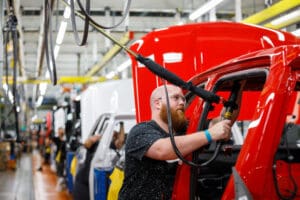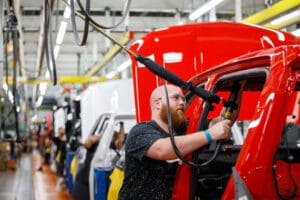UK car production declines for eighth consecutive month amid EV transition challenges


Car production in the UK has fallen for the eighth straight month, intensifying pressure on the automotive industry as it navigates the shift towards electric vehicles (EVs).
According to the latest figures from the Society of Motor Manufacturers and Traders (SMMT), manufacturing output declined by 15.3% in October, producing 77,484 units. This drop leaves the total output down by 10% so far this year.
The downturn comes amid market turmoil following Stellantis—the parent company of Vauxhall—announcing plans to close its van-making plant in Luton, putting up to 1,100 jobs at risk. The company cited the UK government’s stringent zero-emission vehicle (ZEV) mandate as a contributing factor.
Mike Hawes, Chief Executive of the SMMT, expressed deep concern over the industry’s future. “These are deeply concerning times for the automotive industry, with massive investments in plants and new zero-emission products under intense pressure,” he said.
Hawes highlighted that the slowdown in the global market, especially for EVs, has significantly impacted production. He noted that the UK is particularly exposed due to having “arguably the toughest targets and most accelerated timeline but without the consumer incentives necessary to drive demand.”
On Tuesday, Stellantis announced plans to consolidate its UK van manufacturing operations by creating an all-electric hub at its Ellesmere Port plant in Cheshire, investing £50 million in the facility. The decision aims to streamline production and focus on electric vehicle manufacturing in response to the ZEV mandate.
The ZEV mandate requires that at least 22% of new cars sold by each manufacturer in the UK this year must be zero-emission, with the level increasing annually. Stellantis stated that the decision to close the Luton plant was made within the context of these “stringent” regulations.
Jonathan Reynolds, the Business Secretary, told Members of Parliament that ministers had done “everything we possibly” could to prevent the closure of the Luton plant. He also confirmed plans to review the ZEV mandate as part of a consultation on the government’s plan to ban the sale of new “purely petrol and diesel” cars by 2030.
Liam Byrne, Chairman of the Business Select Committee, wrote to Reynolds with a series of questions regarding support for local communities affected by the closure and measures to boost consumer demand for electric vehicles—a concern echoed by several car manufacturers.
The SMMT’s latest figures reveal that the production of battery electric, plug-in hybrid, and hybrid electric cars fell by a third in October. The 24,719 units produced represented 31.9% of the total output.
Overall, production volumes for both domestic and export markets declined in October, down 4.7% and 17.6%, respectively. Notably, eight out of ten cars manufactured in the UK are shipped abroad.
Mike Hawes emphasized the challenges of stimulating demand and meeting regulatory targets, stating: “The cost of stimulating that demand and complying with those targets is huge and, as we are seeing, unsustainable. Urgent action is therefore needed, and we will work with government on its rapid review of the regulation and the development of an ambitious and comprehensive industrial strategy to assure our competitiveness.”
Read more:
UK car production declines for eighth consecutive month amid EV transition challenges






